The equipment repair operates on a terrible business model. Repairmen earn more when equipment breaks down frequently and severely, and they spend more time and effort fixing it. If we want to achieve something big in the repair sector, we need to switch to a more customer-friendly model – and earn from ensuring the equipment doesn’t break down. And here’s how it’s done.
The essence of the project
The problem with repairing equipment in restaurants, construction and other companies is that repairmen charge by the hour. If you think about it, this means that it is profitable for the repairmen to have equipment break down often, and it takes them a long time to repair it, because they will earn more money that way 😉
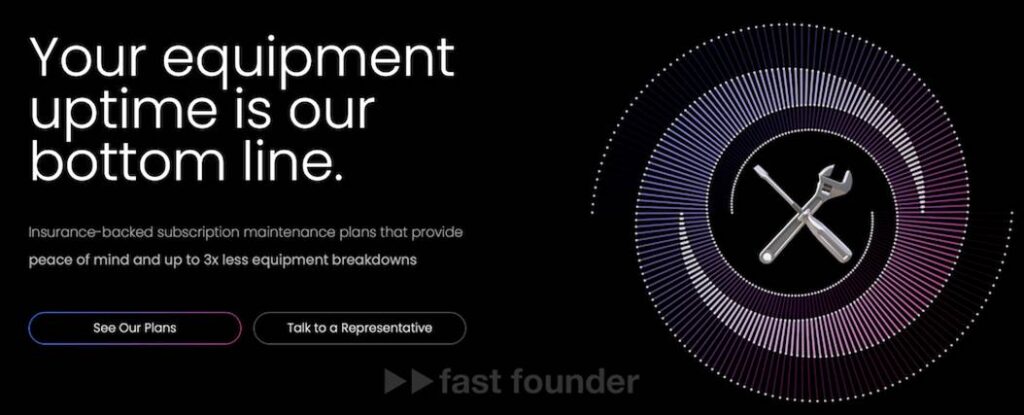
Scription is also in the equipment repair business, but they don’t make money on equipment breaking down – they make money on equipment running without breaking down. The startup claims that equipment that is serviced with their help breaks down 3 times less
often!

The thing about Scription is that they changed the business model for equipment repair. Instead of charging by the hour for repairs during breakdowns, they started charging a monthly subscription fee for the time the equipment is
working.
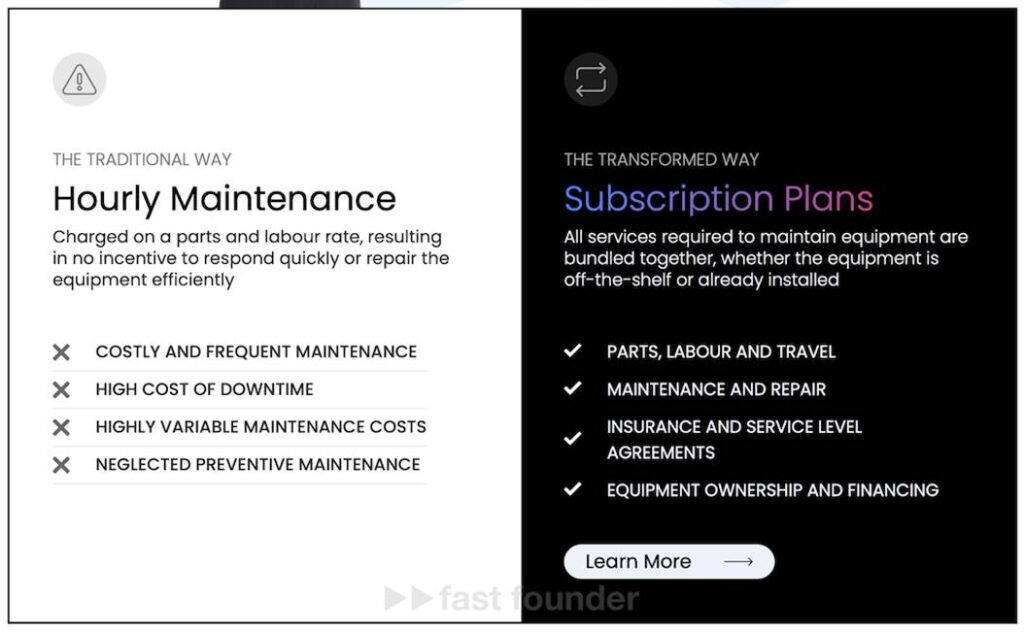
If the equipment does break down, its repair is included in the subscription price – including on-site visit of the technicians, their work and spare parts. In addition, the subscription price includes regular and mandatory preventive maintenance of the
operating equipment – checking, lubricating, wiping, adjusting and replacing worn parts.
In basically, the startup can even, at the customer’s request, lease the necessary equipment or finance its purchase – but with a mandatory subscription to its maintenance.

Scription certainly can’t guarantee 100% uptime, but the terms of the subscription include ensuring a minimum uptime per month and a maximum breakdown response time.

The fixed cost of a monthly subscription is instantly calculated on a case-by-case basis by Scription’s AI machine, which takes into account the type of equipment, its wear and tear, the minimum uptime required by the customer and the maximum response time.

The AI machine is trained on a knowledge base of historical information about the millions of preventive maintenance and repairs that have been performed to maintain the 300,000 parts that make up a variety of different types of equipment.
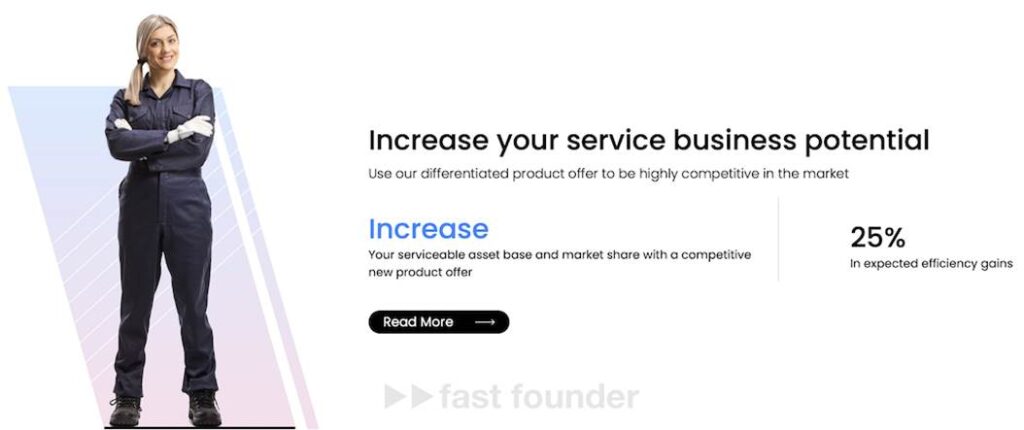
Scription itself doesn’t do repairs, they are purely an IT company. And for preventive maintenance and repairs, they are building a network of repair company partners – promising them that they will make more money with their help than before.
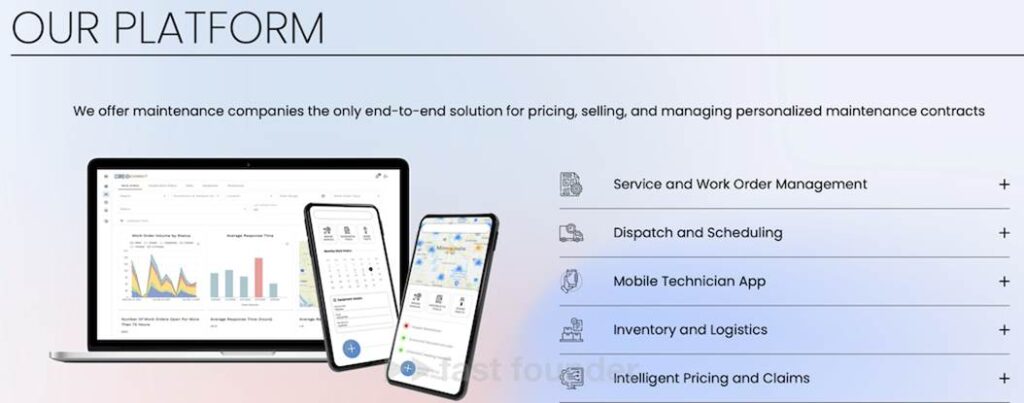
Scription puts its platform in the hands of repairers, with which they can instantly calculate a customer’s subscription price and make a quote, receive regular maintenance reminders and repair calls, keep track of their parts inventory, and do all the other things they need to do.
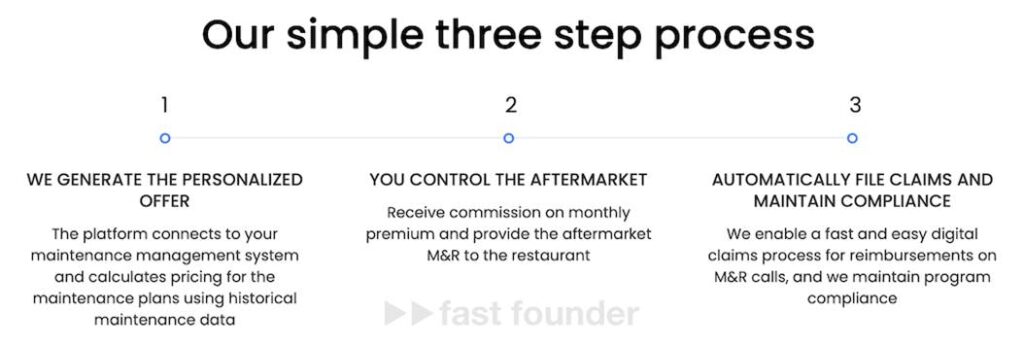
The business model for the interaction between Scription and the repair company is as follows:
- The repairman finds a customer with whom he wants to work on a subscription model and calculates its cost on the platform.
- If the client agrees, he pays the subscription cost to Scription monthly, and the repair company receives a monthly commission from this money.
- During the subscription period, the repair company must perform preventive maintenance on the equipment according to a schedule set by the platform’s AI machine.
- If something breaks down, the company must contact the client and repair the equipment within the time specified by the terms of the subscription.
- After preventive maintenance and repair, the company sends a request for reimbursement of expenses for the work performed through the platform to Scription.
So in fact, Scription is an insurer that gets paid for making sure the customer’s equipment is up and running. And then he uses that money to pay for preventive maintenance and repairs. So he has a clear interest in making sure that the equipment breaks down less often!
Partner repair companies get a product from Scription, with which they can position themselves from competitors who make money on the fact that the customer’s equipment breaks down 😉
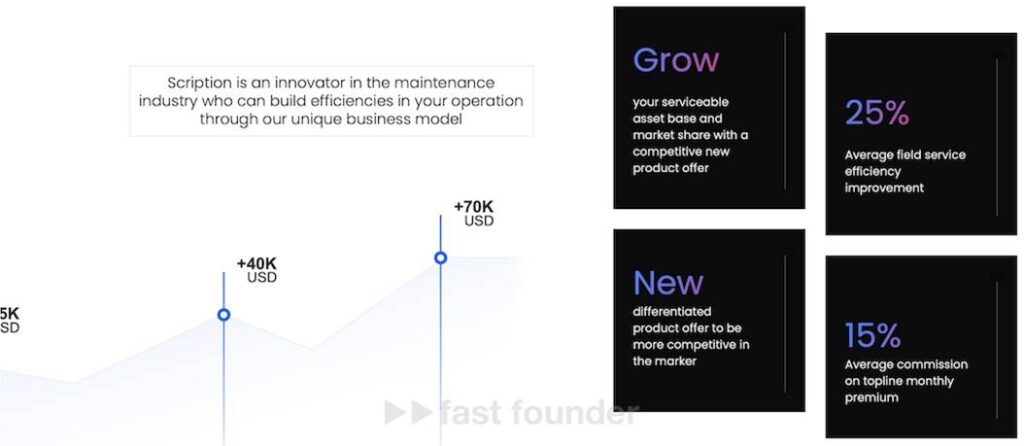
When it comes to money, they start receiving it from the startup on a monthly basis in the form of commissions from the subscriptions of the customers they referred – 15% on average. And by using the Scription platform, the efficiency of repair companies, according to the startup itself, increases by 25% on average.
By next year, Scription is looking to reach the 100,000 locations with its partners servicing $2.5 billion worth of hardware.

The startup has now raised $2.5 million in investment, adding to the $2.3 million it raised a year ago. Before that, it had a small pre-seed investment.
What’s interesting
The general trend is that repair services are slowly starting to move to a subscription model rather than paying for repairs done. I have already written about several startups that have begun to introduce the subscription model to the repair market:
- Honey Homes- home remodeling and home equipment. Raised a
$12.1 million dollar investment.
- Super – appliance and home equipment repair. Raised $79.6 million dollars.
From a business model perspective, a repair subscription is essentially a shift from a conventional repair model (money for repairing breakdowns) to an insurance model (money for making sure everything works properly).
The widespread application of such a model has only now become possible. After all, only AI is able to quickly and accurately calculate the cost of a subscription (insurance) that takes into account the set of specific equipment that the customer has – so that the insurer does not go bankrupt on repairs, and the price is acceptable to the customer.
It is worth remembering that an important component of repair subscriptions is the regular inspection and preventive maintenance of equipment so that it breaks down less often. Therefore, AI should consider not only the likelihood of equipment breakdowns, but also the cost of regular preventive maintenance.
The trend is very correct – because, as noted above, only the subscription model meets the real interests of customers who do not want their equipment to break down. So they are quite willing to pay for the absence of equipment breakdowns rather than the effort to repair it.
This reminds me of the old truth – a good system administrator gets paid for doing nothing 😉 Because a bad system administrator is always busy fixing and configuring something. And a good one sits back and does nothing, because everything works as it is.
And Scription, Honey Homes, and Super are not repair companies themselves. They’re all platforms that bring in real remodelers to do their respective jobs. Which means that you can enter the large renovation market without even being a renovation expert.
It’s the same as Uber entered the cab market without having a single driver or car. And Airbnb entered the travel lodging market without having a single square meter of its own space to stay in.
The good thing about this is that IT has the ability to enter large specialized service markets – while remaining IT companies. At the same time, IT companies are usually worth more than service companies with similar revenues, because the multiples to revenue, by which the value of companies is calculated, are usually higher for IT companies than for others.
This is why Uber once fought to be seen as an IT company rather than a cab service, and Tinkoff also wanted to be seen as an IT company rather than a bank – which they both achieved and went public with very good revenue multiples.
Where to run
The direction of movement is to create IT platforms based on AI technologies that would allow entering service markets with a subscription model while remaining IT companies.
The principle criterion for selecting a market is that it should be able to find sufficient volumes of historical data on which to train a specialized AI machine that calculates an acceptable subscription (insurance) cost for each specific case.
B2B markets seem the most attractive for implementing this model, as businesses are not just inconvenienced by equipment breakdowns, but lose money during downtime due to breakdowns. If my microwave breaks down at home, I can live without it for a few days. If the microwave breaks down in my dark kitchen, I won’t be able to fulfill orders and will start losing money and customers. And those are two big differences – for which I’d be willing to pay very different money.
So today’s Scription is a good and promising example to copy.
In addition, I used the phrase “service markets”, not “equipment repair markets” for a reason in formulating the direction of movement – because insurance can work in quite unexpected
areas
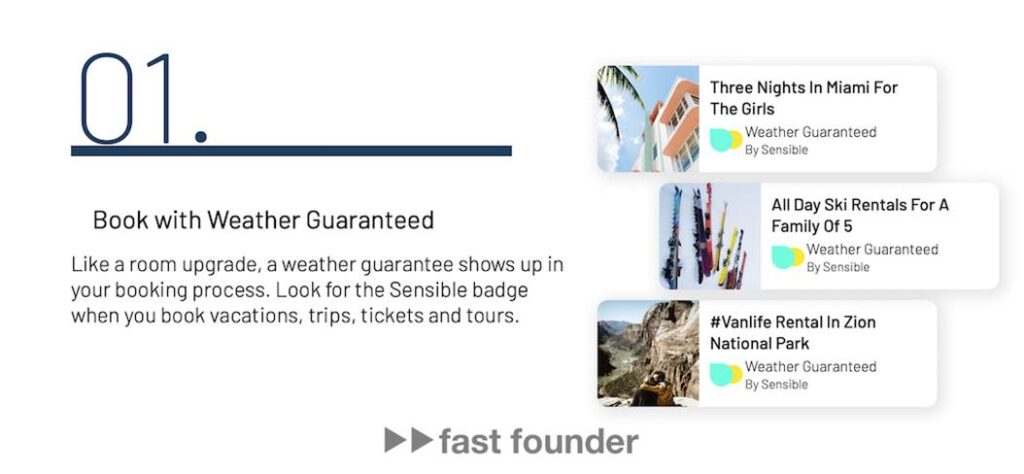
Sensible Weather offers tour and hotel booking sites to add insurance against bad weather. The amount of insurance is dynamically calculated based on historical weather data for a given region at the time of booking. They raised a $16.3 million investment.
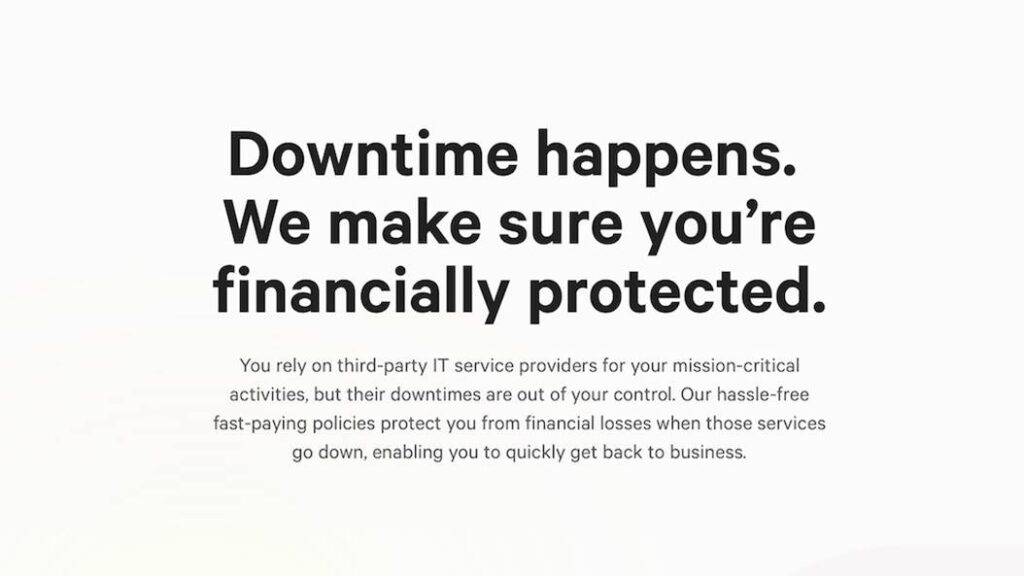
Parametrix offers downtime insurance for cloud services used by companies in their operations. They’ve raised a $27.5 million investment.
So it’s quite possible to still think about how to implement a la Scription’s model in markets for services other than hardware repair. What unexpected services could we introduce a similar subscription model to – so that we don’t get paid for providing services, but for not having to provide them? 😉
About the company
Scription
- Website: scription.ai
- Last Round: $2.5M, 10/10/2023
- Total investment: $6.3M, rounds: 3
